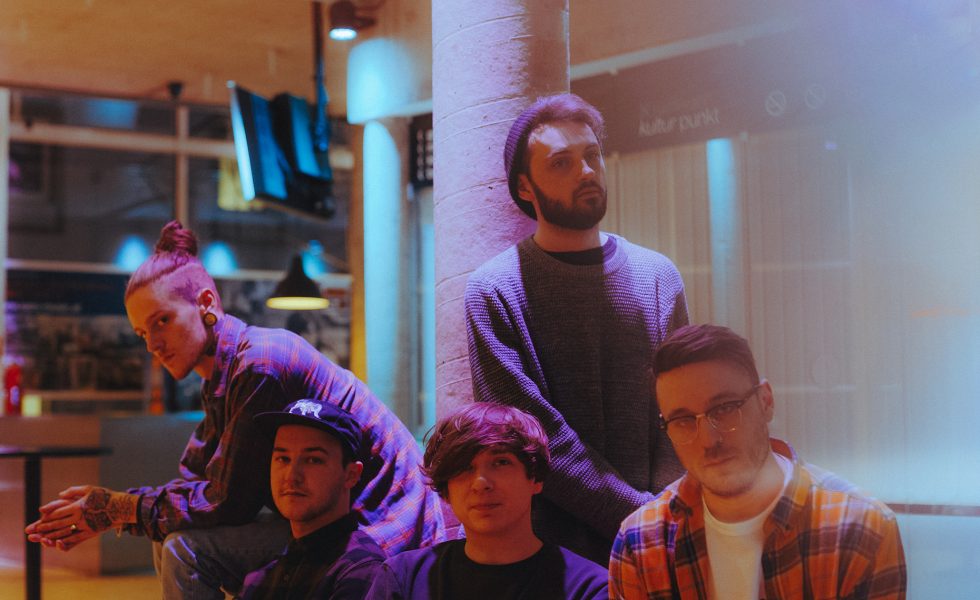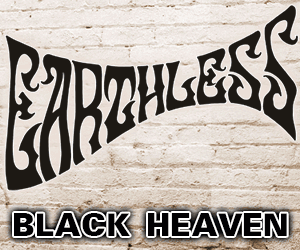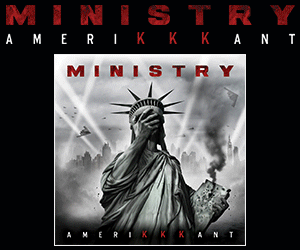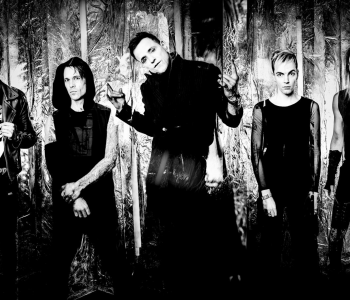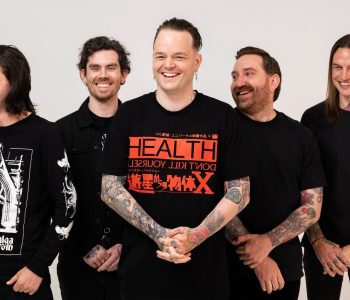Korn‘s Jonathan Davis was so excited by ORGY that he created his own record label …
Hardcore outfit and Welsh natives Casey have been a hard working act since they came on the scene in 2014. In a short time the band has released 2 EPs, toured relentlessly and are about to put out their second album titled Where I Go When I Am Sleeping with much anticipation.
Singer Tom Weaver spoke to Hysteria about the musical direction the band is taking on the new album. Weaver also stresses that Casey doesn’t make music to simply benefit or appease their followers and for us Aussie fans there’s the possibility of Casey touring Australia this year so keep your eyes pealed for further news down the track!
MORE: AFI – Dark Flames & Poisoned Hearts … Sing the Sorrow Turns 15 // THE BRONX – Heart Attack Americans … The Album that Brought Punk Back // MINISTRY – Welcome To The End Of The Damn World, Kids
Hysteria: First off … congratulations on your second album Where I Go When I Am Sleeping. What was the sonic vision behind this album?
Tom: In terms of the direction musically, we’ve never really had a solid plan as to how we want things to pan out. We’ve always been more of a band that develops the music as we go a long and if it feels comfortable we continue with it and if we don’t we just drop it. So the difference with writing between this album and the previous record was a reverse in method because on the previous album we pretty much wrote all of it as a unit in the practice room and when it got time to recording it we had to do it in very segregated bits. It ended up that we finished songs off as individuals, where as this time around we wrote big sections of it individually or as smaller groups and then when we got into the studio everything really came together as a group and we all pitched in our ideas about where it should go. But in terms of the direction the album took … musically there was never really any intent behind it, it was just a case of it being the collection of music we wrote that we felt was best representative of what we thought would be enjoyable at the moment.
How did the title come about?
The title came from when I first started to write the album, going into the studio I had only written 25% of the lyrics and it was exclusively all about my physical and mental health at the time. So the album was originally going to be called “This Routine Is Hell” which is something I had seen online on Tumbler and it’s just something that really resonated with me and it felt reflective of that process of attempting to access help and just the cycle of things back firing but then as I started piecing together the remainder of the record lyrically, it really felt that the title was less and less representative of the content as a whole. So moving towards the end of the recording process I sat down and read through everything and tried to identify themes or ideas that were recurring throughout the record and peripheral ideas surrounding the idea of sleep. All these ideas were quite prevalent and pretty much constant throughout the album and so that’s where the album title came from.
Being a band from South Wales, did you guys stand out as an alternative punk band? Or was there a scene for the type of music that Casey was making?
There’s always been a reigning alternative scene in South Wales, its either incredibly vibrant and active or it regresses for a while and becomes much less potent but at the moment there’s a fantastic scene in South Wales. There’s a lot of great bands coming out that are really helping bring through a younger generation of fans and continue to keep venues alive in South Wales which is wonderful and the last time the scene really thrived was when I was growing up and really got into alternative music, so there are bands like Funeral For a Friend who were coming out at the same time I was really getting into music and it instilled in me a real sense of pride in my whole scene I guess.
It’s something that has never worked against us, the best example of that would be the Thy Art is Murder and Being As An Ocean tour that we did, that was the first time that we really become conscious of the fact that we may be playing to people that didn’t enjoy our music but we came up against very little resistance to it.
[TOM]
What I’m hearing in the new album is a balance between gentle and sensitive moods and then aggressive vocals in the choruses, particularly in a song like Phosphenes; as a vocalist what’s your inspiration behind the clean and harsh approach to vocals?
It’s always just been whatever blends into the music for me I guess. I’ve never been the person to say that a particular sentiment dictates how a vocal should be expressed so there are vocalists that will say “oh this is a very angry song so it has to be screamed to portray that” or “this is a very sad song so it needs to be portrayed like that”. I’ve always felt like vocals are more like an instrument or a vehicle that carries a mood, it doesn’t necessarily need to be reflective of what your saying so it’s just as natural as how the music is developed. There’s been more opportunity to experiment with clean vocals and harsh vocals and how that sits above the music as well as how it interacts with the instrumentation that the rest of the guys use.
Genre lines are blurring in people’s music listening, especially with streaming services now democratising music like never before. As a band that would be appealing to a hardcore audience but also to a broader alternative rock audience, do you think it works in your favour to not be so appeasing to one style of music?
Again it’s the same case with the instrumentation, we’ve never really written with the goal of appeasing a particular demographic, we’ve always wrote what we feel comfortable with and what we think sounds cool but I think your right. I mean I can’t really say as the internet develops because that might have been the case with Myspace, that was when social networking was really starting to thrive but in this day and age people live on the internet so it’s already as developed as it’s going to get, but I think it is becoming more acceptable for particularly young demographics to have more varied taste in music. You have a lot of hardcore bands that really promote and really endorse bands like Turnover and Basement. It’s becoming a lot more acceptable for people to have a considerably more varied taste in music and it’s something we experience in the band as well, between us we listen to an incredibly wide variety of styles. It’s something that has never worked against us, the best example of that would be the Thy Art is Murder and Being As An Ocean tour that we did, that was the first time that we really become conscious of the fact that we may be playing to people that didn’t enjoy our music but we came up against very little resistance to it. Even if people came up to us afterwards and said that really wasn’t my thing we always had a full room every night and there were people who were respectful enough to just stand there and listen to what we had to say and listen to the music we were playing and that’s all we can really ever expect of an audience. We’ve never encountered any negative pushback from a varied audio palette.
You guys will be hitting the road around Europe very shortly, is there plans to travel further abroad, perhaps Australia is on the cards?
We’re just ironing out some of the final details of it; it is our hope that we will be going to Australia during the year.
That’s exciting news, what do you love the most about playing live? And how do your fans react to your emotionally charged music?
It’s a difficult perspective to address because I’ve never written music for the sake of other people and never really played it for their benefit and whilst our fan base is incredibly invested we do try to retain a positive community between ourselves and the fans. Where very interactive, we enjoy speaking to them, this sort of artist and audience relationship for me goes as far as I’m going to play these songs and that’s my end of the bargain and your going to stand there and listen to them and that’s as far as our expectations of each other should go. I’ve never been the person to say—I need to play live music to thrive, I play live because I enjoy playing music, the day that I stop enjoying playing music I’m not going to be the person that feels morally obligated to perform it because we have a fan base. We play music live because we enjoy playing music live whether where playing to 5, 55, 500 or 5,000 people it doesn’t really make any difference to us, we just like playing music (laughs).
What’s next for you guys after you’re done with the tour?
There’s going to be another big tour at the end of the year, hopefully again trying to work out whether the U.S is feasible. Just like any other band we just do more touring and work on our creative collaboration to keep ourselves busy and do things that people might be interested in.
And finally what do you hope to achieve with Casey as far as the band’s legacy is concerned?
There was a saying posted on Twitter from a friend of mine who was reviewing a film and he said “ You only die twice, once when your body leaves the earth and once your name has been said for the last time” and that’s how I would view the band’s legacy. When we break up I feel that we’re not going to be the band that can get back together for a reunion tour, once we’ve been creatively fulfilled that will be the end of its existence but until then it will live on through the house we’ve created through people’s opinions and memories of it. I guess the goal as with any creative being is to live forever or to live for as long as possible. We would like to leave the impression of a legacy for the community that we try to cultivate and that is based on inclusivity, positivity and we do try to remain as active as possible with our fan base, I suppose we would just like to be remembered as the band that were nice.


